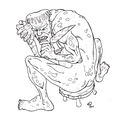Template:Selected anniversaries/July 27: Difference between revisions
No edit summary |
No edit summary |
||
| Line 17: | Line 17: | ||
||1866 – The first permanent transatlantic telegraph cable is successfully completed, stretching from Valentia Island, Ireland, to Heart's Content, Newfoundland. | ||1866 – The first permanent transatlantic telegraph cable is successfully completed, stretching from Valentia Island, Ireland, to Heart's Content, Newfoundland. | ||
||Derrick Norman Lehmer (b. 27 July 1867) was an American mathematician and number theorist. Pic. | |||
File:Ernst Zermelo 1900s.jpg|link=Ernst Zermelo (nonfiction)|1871: Logician and mathematician [[Ernst Zermelo (nonfiction)|Ernst Friedrich Ferdinand Zermelo]] born. His work will have major implications for the foundations of mathematics; he will be known for his role in developing Zermelo–Fraenkel axiomatic set theory, and for his proof of the well-ordering theorem. | File:Ernst Zermelo 1900s.jpg|link=Ernst Zermelo (nonfiction)|1871: Logician and mathematician [[Ernst Zermelo (nonfiction)|Ernst Friedrich Ferdinand Zermelo]] born. His work will have major implications for the foundations of mathematics; he will be known for his role in developing Zermelo–Fraenkel axiomatic set theory, and for his proof of the well-ordering theorem. | ||
| Line 30: | Line 32: | ||
File:Hendrik_Antoon_Lorentz.jpg|link=Hendrik Lorentz (nonfiction)|1904: Physicist and crime-fighter [[Hendrik Lorentz (nonfiction)|Hendrik Lorentz]] uses the Zeeman effect to detect and prevent [[crimes against mathematical constants]]. | File:Hendrik_Antoon_Lorentz.jpg|link=Hendrik Lorentz (nonfiction)|1904: Physicist and crime-fighter [[Hendrik Lorentz (nonfiction)|Hendrik Lorentz]] uses the Zeeman effect to detect and prevent [[crimes against mathematical constants]]. | ||
||Kenneth Tompkins Bainbridge (b. July 27, 1904) was an American physicist at Harvard University who did work on cyclotron research. His precise measurements of mass differences between nuclear isotopes allowed him to confirm Albert Einstein's mass-energy equivalence concept. | ||Kenneth Tompkins Bainbridge (b. July 27, 1904) was an American physicist at Harvard University who did work on cyclotron research. His precise measurements of mass differences between nuclear isotopes allowed him to confirm Albert Einstein's mass-energy equivalence concept. He was the Director of the Manhattan Project's Trinity nuclear test, which took place July 16, 1945. Bainbridge described the Trinity explosion as a "foul and awesome display". He remarked to J. Robert Oppenheimer immediately after the test, "Now we are all sons of bitches." | ||
||1907 – Irene Fischer, Austrian-American geodesist and mathematician (d. 2009) | ||1907 – Irene Fischer, Austrian-American geodesist and mathematician (d. 2009) | ||
Revision as of 18:27, 20 March 2018
1801: Mathematician and astronomer George Biddell Airy born. His achievements will include work on planetary orbits, measuring the mean density of the Earth, and, in his role as Astronomer Royal, establishing Greenwich as the location of the prime meridian.
1844: Chemist, meteorologist, and physicist John Dalton dies. He proposed the modern atomic theory, and did research in color blindness.
1871: Logician and mathematician Ernst Friedrich Ferdinand Zermelo born. His work will have major implications for the foundations of mathematics; he will be known for his role in developing Zermelo–Fraenkel axiomatic set theory, and for his proof of the well-ordering theorem.
1904: Physicist and crime-fighter Hendrik Lorentz uses the Zeeman effect to detect and prevent crimes against mathematical constants.
1928: Electrical engineer and physicist John Ambrose Fleming marries the popular young singer Olive May Franks of Bristol.
1938: Mathematician and philosopher Edmund Husserl publishes new class of Gnomon algorithm functions based on transcendental consciousness as the limit of all possible knowledge.
1938: Game designer Gary Gygax born.
1973: Math photographer Cantor Parabola takes advance photographs of the House of Representatives Judiciary Committee voting to recommend the first article of impeachment against President Nixon.
1974: Watergate scandal (nonfiction): The House of Representatives Judiciary Committee votes 27 to 11 to recommend the first article of impeachment (for obstruction of justice) against President Richard Nixon.
1974: Writer and philosopher Culvert Origenes says that "it's about time the House Judiciary Committee got busy impeaching Nixon."









